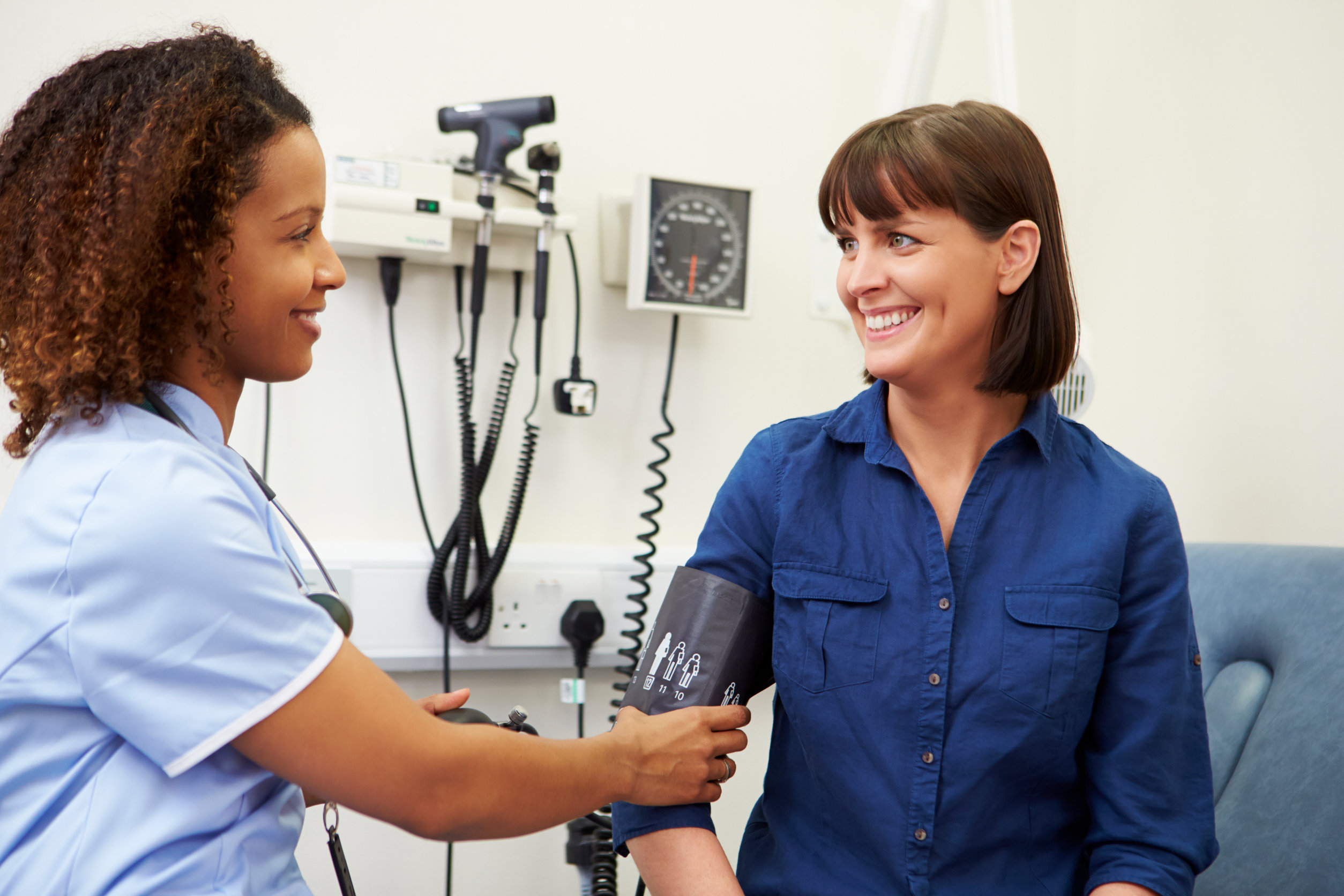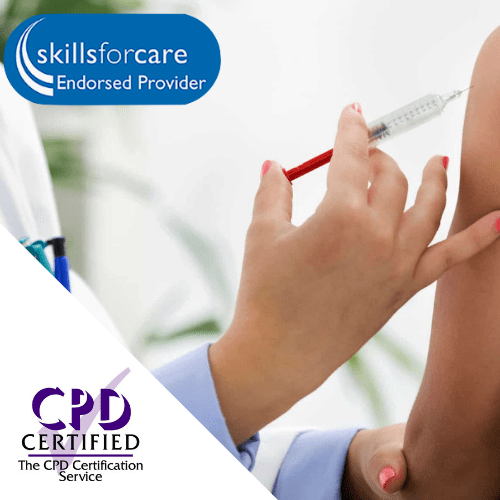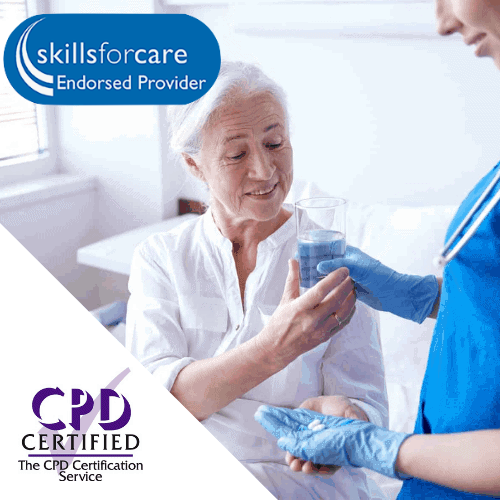In this Nurse Career Guide
What Does A Nurse Do?
A nurse is a trained and registered individual who cares for patients with various injuries, illnesses, diseases and disabilities. There are many different nursing roles, including an adult nurse, children’s nurse, learning disability nurse and mental health nurse. There are also specialist areas within these types of nursing, e.g. cardiac and theatre.
Nurses predominately work in healthcare settings, such as hospitals, GP surgeries, hospices, care homes, and even patients’ homes. They can also work in a control room and provide advice over the telephone. They treat patients of all ages and backgrounds who have different medical issues – from individuals with minor injuries to those with long-term diseases.
Nurses will be the main point of contact for patients and their families. They have many duties, including providing and coordinating patient care, carrying out various care procedures, monitoring patients, and providing support, education and advice. The role can also have an element of administrative work, such as maintaining patient records and writing reports.
A nurse’s main aim is to deliver the best possible patient care by focussing on the needs of the individual receiving treatment. They help and care for patients in times of need, whether it is helping to save a person’s life, enhancing their quality of life, providing support or even providing end of life care. Nurses also have an important role in education and promoting patient health and wellbeing.
Nurses will usually work as part of a multidisciplinary team with consultants, doctors, GPs, specialists, other nurses and other healthcare workers. They will also work with patients, families and the public. There may be times when nurses work alone, i.e. travelling to patients in the community.
Most nurses will work for large organisations, such as the NHS, but they can also work for smaller companies, such as private clinics and charities. Some nurses may choose to become self-employed, e.g. providing consultancy services or working through employment agencies.

Responsibilities
A nurse will have many different responsibilities, which may include (this list is not exhaustive)
- Writing and following patient care plans.
- Using various medical equipment.
- Assisting doctors with physical examinations, tests and evaluations.
- Checking and administering drugs and injections.
- Providing pre-operation and post-operation care.
- Taking temperatures, blood pressures, samples (blood) and pulse rates.
- Cleaning and dressing wounds.
- Setting up drips and blood transfusions.
- Assessing, monitoring and observing patients’ condition and progress.
- Liaising closely with patients on their needs and involving them, their families and their carers (where applicable).
- Providing education and promoting health and wellbeing, e.g. smoking cessation and weight loss.
- Providing emergency care promptly where required.
- Advising, reassuring and supporting patients and their families.
- Liaising with other healthcare professionals, such as doctors and specialists to identify the care needed.
- Providing handover information to others after a shift.
- Advocating for patients.
- Maintaining patient records and writing reports.
- Supervising and supporting student nurses and other new staff.
- Maintaining a clean and hygienic environment in line with infection prevention and control.
- Complying with policies, procedures, care plans and risk assessments.
The exact responsibilities a nurse will have will depend on the role and the type of nursing and healthcare setting.
Working Hours
A nurse can expect to work 37–42 hours a week, but the average tends to be around 37.5 hours per week. No two days are the same, and it is not a 9–5 job. Nurses are often required to work shifts at unsociable hours, e.g. early starts, evenings, nights, weekends and bank holidays.
Flexible working is possible for some nurses, e.g. part-time hours or a job share. There are even opportunities for remote working from home with certain roles.
Travel may be necessary for some nurses, i.e. those who work in the community. There may be a requirement to cover nurses in other areas, and there may also be opportunities to work overseas.
The shifts can be quite long and up to 12 hours a day in some cases. Most of this time will require nurses to be on their feet, so they must have a certain fitness level.

What to Expect
Being a nurse is not easy, but it is a rewarding career choice, as they care for people in times of need and even help save lives. Nurses can go home at the end of the working day knowing they have made a difference to patients and their families. They are also classed as key workers and are respected and appreciated in society.
There is no shortage of nursing (and related) roles; there are jobs available nationally, and there are many different roles in which to specialise. The salary for a nurse is also good when compared to other jobs, even at entry level. However, it does reflect the level of education, training and commitment needed to become a nurse.
Boredom will never be a problem for nurses, as their work is very varied and fast-paced. They will see and care for many different people with various medical needs throughout their shifts. One moment they may need to clean and dress a patient’s wound, and the next take an ill patient’s temperature and blood pressure.
Even though being a nurse is rewarding, and there are many positives associated with the role, they may also face challenges, for example:
- Complex and high-pressured situations – each patient will have different medical needs, and some may require emergency care. Nurses will need to be capable of working in pressured situations and challenging environments. They have a lot of responsibility, and if they make mistakes, it could cost lives. Prospective nurses should be aware that there can be life or death situations.
- Physical demands – the role requires nurses to be on their feet for long periods, and there may be a need to perform physical tasks, such as lifting and moving patients. Therefore, they will need to be physically fit.
- Distressing scenes – some scenes may be upsetting for nurses. There may be blood, vomit, burns, broken bones and other unpleasant sights. It can be emotionally demanding dealing with injured or unwell patients and their families. Babies and young children may also be involved, which can be too much for some people. If an individual cannot cope with distressing scenes or is squeamish, being a nurse would not be the right career path.
- Exposure to germs – employers must have precautions in place to reduce the risk of exposure to germs, such as viruses and bacteria, i.e. infection control. However, there is a risk of exposure when working with different patients in a clinical environment, e.g. bodily fluids and germs. Nurses will usually be required to wear a uniform and protective equipment, such as aprons, masks and gloves.
- Work-related violence – there is a risk of verbal and physical abuse when working in healthcare. It is usually due to alcohol and drug-related issues, but people can also lash out when in pain or distress. Employers have a duty to reduce and manage the risk of work-related violence, so there are ways of prevention. However, nurses must be aware of the risk.
There are pros and cons in every career choice, and prospective nurses must know what to expect before deciding whether the role is for them. There is no doubt that working in healthcare and with injured or unwell people is challenging and stressful.
It is also physically and mentally demanding, the shifts are often long and unsociable, and there are distressing scenes. However, there are many positives too, and saving lives and helping people is why individuals enter the nursing profession.
When considering whether to be a nurse, individuals should look at the pros and cons. They should also ensure they have the necessary personal qualities to carry out the role and responsibilities required.
Personal Qualities Needed To Be A Nurse
Some of the personal qualities that a nurse requires will include (this list is not exhaustive):
- The ability to work in a physically demanding role, e.g. lifting and moving patients.
- Knowledge of healthcare, anatomy and psychology.
- Knowledge of related legislation and standards.
- Knowledge of health and safety and infection control.
- Knowledge of confidentiality, data protection and GDPR.
- Having a caring attitude, sensitivity, empathy and understanding.
- Having confidence, patience and a reassuring manner.
- Enjoying being hands-on with people on a daily basis.
- Excellent interpersonal skills, i.e. the ability to deal with patients, families, members of the public, and other healthcare professionals.
- Excellent communication skills, both written and verbal.
- Good customer service skills.
- Good problem-solving and decision-making skills.
- Good listening skills and the ability to give and follow instructions.
- Good organisational and leadership skills.
- Good time management.
- Being motivated and committed to helping people.
- Being thorough and having attention to detail.
- Being flexible and open to change.
- The ability to work both in a team and alone using own initiative.
- The ability to be resilient in emotionally demanding situations.
- The ability to gain patients’ trust and confidence.
- The ability to accept criticism.
- The ability to work under pressure and remain calm in stressful situations.
- The ability to use IT equipment and software competently.
- The ability to work with and maintain different medical equipment.
Qualifications
To become a nurse, individuals need a degree approved by the Nursing and Midwifery Council (NMC) run at an approved educational institution (AEI). Undergraduate degrees usually take three years (full time). To be accepted onto an undergraduate degree course typically requires:
- Two or three relevant A levels, including science (or equivalent, e.g. a level 3 diploma or access to higher education in health, science or nursing); and
- Four to five GCSEs (grades A–C), including English language, maths and at least one science.
If an individual already has a degree in a related subject, such as social work, life sciences, biological sciences or psychology, they may be able to enrol on a two-year accelerated pre-registration postgraduate course. This is known as an accreditation of prior learning (APL), and it takes into account previous learning and/or practice-based learning. It means that individuals may become registered as a nurse and practise in two years instead of three. It will depend on the university entry requirements, and individuals should check before applying.
There is also an opportunity to apply for a nursing degree apprenticeship. Individuals should have four or five GCSEs at grades 9 to 4 (A* to C) and two to three A levels, or equivalent, including biology. The NMC has further information on apprenticeships on its website. The armed forces (the RAF, Royal Navy and Army) can also provide a route into a career in nursing.
There is financial support available for those wishing to study for a health-related degree. Further information about funds and eligibility can be found on the NHS website.
On successful completion of an approved qualification, individuals must register with the NMC to work as a nurse. Registration must be maintained to continue to practise nursing, which is known as revalidation. There is a cost to become registered and for maintaining registration.

Work Experience
To become a registered nurse, individuals will require a degree, as mentioned. However, other options can help individuals work towards entering the profession, for example:
- Work experience – it is possible to start work as a nursing associate whilst studying for a degree. Individuals can also get a paid role in healthcare or social care before applying for a course.
- Volunteering – gaining practical experience through volunteering can help towards becoming a nurse. An individual can volunteer at their local NHS trust or a charity, such as a hospice. Alternatively, there may be work placement opportunities in private clinics and care homes.
Individuals may have an opportunity to shadow an experienced nurse at their local hospital or clinic to find out more about the role and see if it is the right career path for them.

Training Courses
Learning does not stop with experience or once someone becomes qualified. Attending relevant training courses and having additional certifications can help nurses enter the profession, enhance their employability and keep their knowledge and skills current.
Most colleges and accredited private training providers provide training courses. Some examples of relevant courses that may be useful for nurses include:
- Care certificate.
- Equality and diversity.
- Infection control.
- Needles and sharps.
- Mental health and capacity.
- Deprivation of Liberty Safeguards (DoLS).
- COVID-19 awareness.
- Health and safety, e.g. manual handling and COSHH.
- Understanding GDPR.
Professional bodies and associations, such as the NMC and the Royal College of Nursing, can advise on reputable training courses. They also have events that can help nurses and give them the means to continue their professional development. Continuing professional development (CPD) is a mandatory requirement for NMC registration. Also, see CPD courses for nurses for further guidance on CPD.
The type of training required will depend on what employers are looking for and the CPD requirements for registration. As well as looking on professional body websites, it is also worth looking at several job advertisements to identify the courses required and other training needed for specialist roles. Jobs can be found on NHS Jobs, Nurses.co.uk, Nursing Times, HealthJobsUK, RCN Bulletin Jobs, Bupa Careers and other job sites, such as Armed Forces Careers and Indeed.
Having more relevant training and competence will open up more opportunities for nurses. Refresher training will also be required, as it is a legal requirement under legislation, and it keeps knowledge and skills up to date.
Criminal records checks
Nurses will be required to undergo a criminal record check, as they may come into contact with children and vulnerable adults. Having a criminal record, caution, warning or conviction may put off prospective employers. However, they should account for the seriousness of the crime, when it occurred and its relevance to the nursing role.
The organisation that holds criminal records will depend on the country within the UK, for example:
- England and Wales – Disclosure and Barring Service (DBS).
- Northern Ireland – AccessNI.
- Scotland – Protecting Vulnerable Groups (PVG) scheme.
Driving
Some nurses will be required to drive as part of their role, especially when working in the community. Therefore, they should have a full clean driving licence.

Where Do Nurses Work?
Nurses can work in many different settings, including (this list is not exhaustive):
- Hospitals.
- Community health centres.
- GP surgeries.
- Universities, colleges and schools.
- Clinics.
- Residential care homes and nursing homes.
- Hospices.
- Control rooms, e.g. taking urgent and non-urgent calls.
- Daycare centres.
- Patients’ homes and in the community.
- Their own homes or business premises.
- Prisons.
- Cruise ships.
- Police custody suites.
They can work for public bodies and private organisations, for example:
- The NHS.
- HM Prison Service.
- Private hospitals and clinics, e.g. Bupa and Nuffield Health.
- Charities, e.g. hospices.
- Travel companies.
- The armed forces, e.g. the RAF, Royal Navy or Army.
They can also be self-employed and work for themselves or work for a nursing agency.

How Much Do Nurses Earn?
If a nurse decides to work for the NHS, their salary is subject to a band pay system (agenda for change pay rates). For example (these are a guide only and are subject to change):
- Starting salary (band 5) – between £25,655 and £31,534.
- More experienced nurses (band 6) – between £32,306 and £39,027.
- Nurse managers (band 7) – between £40,057 and £45,839.
- Lead/senior nurses (band 8a) – between £47,126 and £53,219.
- Consultant nurses/matrons (band 8b) – between £54,764 and £63,862.
- Head of services/directors (band 8c) – between £65,664 and £75,874.
The exact salaries for nurses will depend on the role, location (London supplement) and years of experience. As nurses progress in their careers and enter more senior positions, the band will increase. The NHS also provides a training salary for trainees (known as annex 21).
There is potential for nurses to earn more if they work in other settings, e.g. private hospitals and clinics. However, the NHS does provide generous benefits, e.g. pension scheme, sickness and maternity. Experienced nurses may be able to earn higher salaries if they combine clinical work with research and teaching.
As an apprentice, the salary will depend on an individual’s age and how long they have been in their apprenticeship. Apprentices must earn at least the current National Minimum Wage (NMW). Some employers will pay more than this, but it will depend on the organisation and role on offer.

Types of Nursing Roles To Specialise In
Not only are there opportunities for nurses to move up the career ladder and work in various locations, but there are also many different roles in which they can specialise.
There are four main roles, which are:
- Adult nursing – helping and treating adult patients aged between 18 and 65.
- Children’s (paediatric) nursing – helping and treating babies and young children.
- Learning disability nursing – helping and treating patients with learning disabilities to lead independent lives. Usually working in community-based or supported-living settings.
- Mental health nursing – working with patients with various mental health issues.
In addition to the above roles, nurses can also specialise in specific areas, such as (this list is not exhaustive):
- Community nurse – helping and treating patients in the community, i.e. in their own homes or community health centres.
- Anaesthetist nurse – helping anaesthetists administer anaesthesia and other medications.
- Theatre nurse – carrying out certain surgical procedures under the supervision of a consultant surgeon.
- Neonatal nurse – caring for premature and sick newborn babies.
- Geriatric nurse – caring specifically for elderly patients.
- Forensic nurse – using nursing techniques and methods to legal proceedings and liaising with victims of crimes and offenders.
- Wellbeing nurse – working in occupational health and promoting health and wellbeing.
Nurses can also specialise in specific areas of the body, related conditions, procedures and departments, for example:
- Gastroenterology (endoscopy) nurse – assisting endoscopists and supporting patients with gastrointestinal tract and digestive system problems.
- Outpatients nurse – caring for people who have not been admitted to a hospital but require some form of treatment.
- Cardiac nurse – caring for patients who have problems with their cardiovascular system, e.g. heart attack and diseases.
- Hepatology nurse – caring for patients who have problems with their liver, e.g. chronic liver disease.
- Trauma and orthopaedics nurse – caring for patients with trauma, bone infections and those needing limb reconstruction work.
- Infection prevention and control nurse – specialising in developing and implementing infection prevention and control techniques.
There are so many different nursing roles and specialisms to choose from and far too many to mention here. All different nursing roles will require differing knowledge, skills, experience and qualities. Some may need specific qualifications, e.g. a degree in mental health nursing, and additional training for specialised areas.
Most nurses will need to know how to carry out various care procedures, utilise different techniques and equipment, and maintain patient records. Any additional areas of expertise will depend on what an organisation is looking for in a nurse and the type of work a nurse wants to carry out.
If nurses do not carry out their role effectively, it can result in a patient’s condition worsening and may even cost lives. Therefore, whatever the type of role, nurses must have the necessary competence (knowledge, skills and experience) to carry out the work professionally and safely. They should also know the limits of their competency and not carry out techniques or treatments if they have not been trained and are not competent.

Professional Bodies
Nursing standards, techniques, technologies and laws are updated regularly. Therefore, nurses need to keep abreast with the latest developments and changes in legislation to remain legally compliant and ensure they carry out their roles effectively and safely. CPD gives nurses the knowledge and skills to keep up to date with these changes and understand their responsibilities. It also helps them stay registered with the NMC and allows them to progress their career.
Joining a professional body can help prospective and current nurses enhance their skills and overall career. The NMC and the Royal College of Nursing offer different levels of membership, CPD, access to industry contacts and networking events.
There is ample opportunity for career progression within nursing, and it is a diverse field. With more qualifications and experience, a nurse can become an advanced nurse practitioner, manager, matron and even head of service. They can also decide to focus on a specific area of nursing, such as midwifery, mental health or paediatrics. Alternatively, they may choose to become self-employed as a consultant.
Having the knowledge, skills and experience in nursing can also lead to a career in different areas. For example, a nurse may want to work in education and training or research. They may want to work in other areas of healthcare, e.g. occupational health or disability assessment.

















